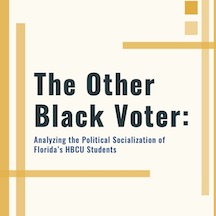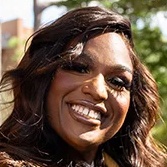 A new study led by Amanda Wilkerson, an assistant professor of higher education at the University of Central Florida in Orlando, highlights the perspectives of Black youth voters at Florida HBCUs and how they engage with politics to effect change. The research synthesized input from Black youth voters in the 18-29 age range, examining the civic engagement discourse and initiatives they value the most.
A new study led by Amanda Wilkerson, an assistant professor of higher education at the University of Central Florida in Orlando, highlights the perspectives of Black youth voters at Florida HBCUs and how they engage with politics to effect change. The research synthesized input from Black youth voters in the 18-29 age range, examining the civic engagement discourse and initiatives they value the most.
“HBCUs have shaped elections and the entire political landscape but are often ignored by researchers,” said Rebecca Entress, a postdoctoral researcher in the School of Public Administration at the University of Central Florida and a co-author of the study. “This research sheds light on how students at HBCUs form their political opinions, how they vote, and how they feel about political messaging.”
In conducting their study, researchers traveled to select Florida HBCUs to administer surveys and focus groups. Students were asked about political socialization, relevant political issues, political advertisements, and the importance of culturally relevant messaging.
The researchers found six critical themes emerged from their study:
-
- Digital Messaging Doubts: Participants found messaging on social media to be untrustworthy.
- Campaign Messaging Failures: Negative campaign advertisements tend to instill a heightened sense of uncertainty toward the sender.
- Historical Meaning of Voting: Young voters now prefer to vote only when they feel they can trust elected officials’ commitment to advancing their interests rather than voting to participate.
- Voter Apathy Doesn’t Stop Voter Activism: Participants may not vote if there is no candidate they feel strongly about. Instead, they might engage in other forms of civic participation, such as protesting.
- Political Party Dissonance: Young voters tend to take a more critical standpoint on partisanship.
- Administrative Voting Burdens: Increased bureaucratic challenges that Black college-aged individuals might experience can affect their voting engagement.

Dr. Wilkerson joined the department of educational leadership and higher education at the University of Central Florida in 2019. She earned bachelor’s and master’s degrees in political science from Florida A&M University and a doctorate in higher education and policy studies from the University of Central Florida.
The report, The Other Black Voter: Analyzing the Political Socialization of Florida’s HBCU Students, was published by the Rutgers Center for Minority Serving Institutions, where Dr. Wilkerson is a visiting scholar.

